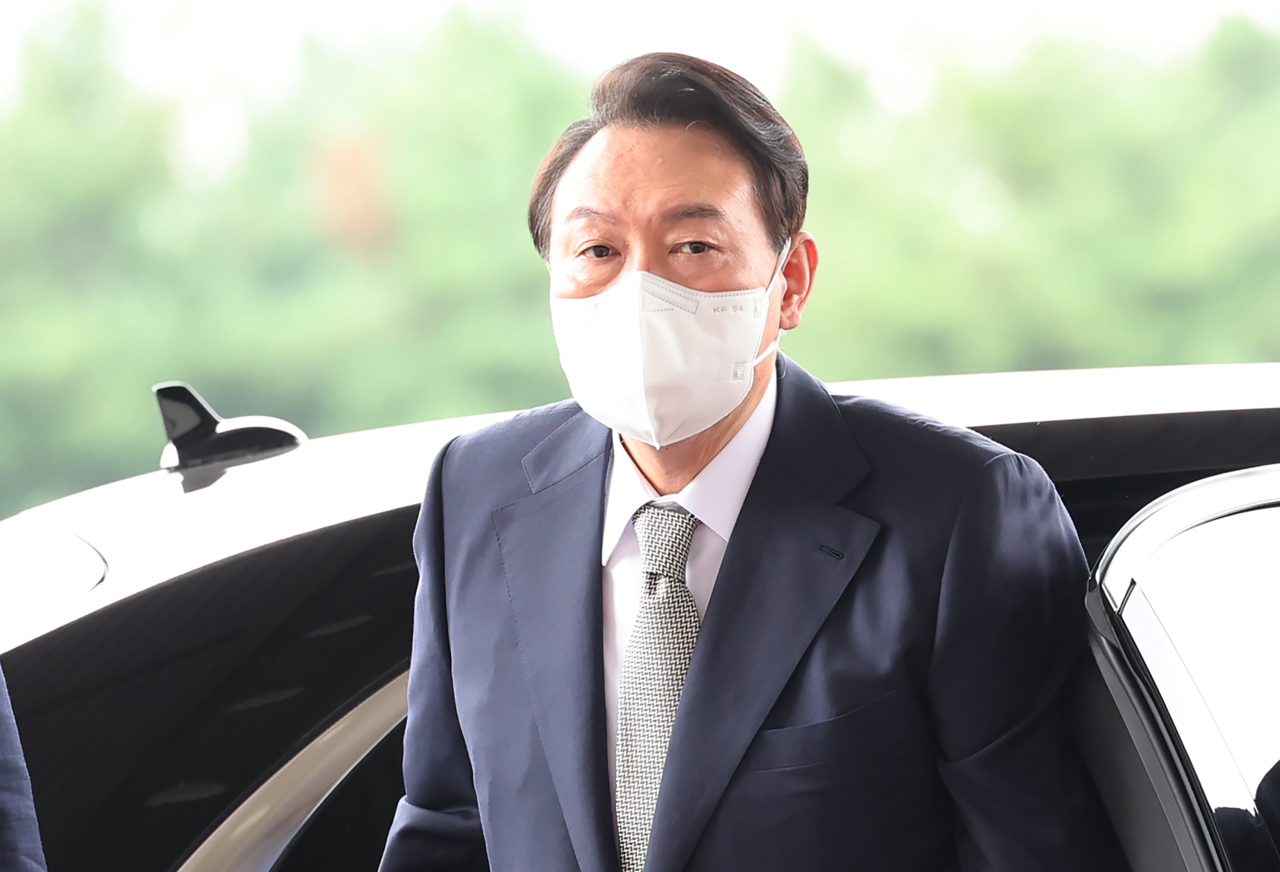North Korea human rights initiatives return under Yoon
Partisan bickering ramps up over their revival
By Kim ArinPublished : Aug. 23, 2022 - 18:17

The Yoon Suk-yeol administration is taking a series of steps to revive North Korea human rights initiatives that were paused or downscaled under president Moon Jae-in.
The ruling People Power Party and the main opposition Democratic Party are clashing over the push for their revival, most recently over the government North Korea human rights foundation.
People Power Party interim chair Rep. Joo Ho-young called for the main opposition’s cooperation in the belated launch of the North Korea Human Rights Foundation, as well as the appointment of an inspector general in charge of overseeing audits of the presidential office.
“The two posts were not filled for the last five years. This is a grave dereliction of duty for the National Assembly,” he said during Monday’s meeting. “For the six years since the laws on North Korean human rights were passed, the Democratic Party has been ignoring those laws.”
The Foundation’s establishment and operation have basis in the North Korean Human Rights Act enacted in 2016. The Act’s went into effect after 11 years of partisan gridlock amid fierce opposition from the Democratic Party.
The Democratic Party has rejected the offer to join efforts for appointing foundation chair, while arguing for a swift appointment of the inspector general auditing the president and his aides.
Rep. Park Hong-keun, the Democratic Party’s floor leader, told reporters on the same day that “there are a myriad of tasks facing the National Assembly.”
“It seems the ruling party has some other motives for pushing the appointment (of the Foundation head),” he said.
The bickering erupted after the Ministry of Unification on July 25 sent an official letter to the National Assembly requesting the parties’ recommendations for the chair.
According to Yang Seung-ham, an emeritus professor of political science at Yonsei University in Seoul, the Democratic Party and the liberal bloc shied away from highlighting North Korea’s human rights concerns, taking a “more dovish approach and strategic patience.”
“North Korea is considered the country with the worst human rights track record, and they are also extremely averse to criticism on that front from the international community,” he said.
“So an envoy and other bodies digging after their human rights violations is going to strike a nerve with them.”
Last month, political science scholar with North Korea expertise Lee Shin-hwa was tapped as the new envoy for North Korea human rights, a position that had remained vacant for the past five years.
The government is convening a meeting of the Council of North Korean Human Rights for the first time in over two years on Aug. 25. While the Act says the Council is to meet at least once every quarter, the last meeting was on May 11, 2020.
On the repose, a June report by the government-funded think tank Korea Institute for National Unification pointed out that for South Korea to “play a leading role in the protection and promotion of human rights in North Korea,” such inter-ministerial Council “needs to function properly.”
The Yoon administration is “not doing enough of what they could do be doing in the absence of Democratic Party cooperation,” according to Shin Hee-seok, an international law expert with the Transitional Justice Working Group.
In a phone call with The Korea Herald, Shin said the Act on North Korea human rights comprised two main parts. One is a foundation investigating the status of human rights in North Korea and engaging in research and policy development related to improvement of human rights there. The other is an archive storing records related to the North Korea human rights situation.
“No such foundation has ever launched since the Act was passed. The archive’s staff and budget were drastically depleted after Moon came into office,” he said.
The budget allotted to the North Korea Human Rights Archive in 2018 was cut to 177 million won ($131,991), which is about one tenth of its 2017 budget of 1.8 billion won, according to the Ministry of Justice data obtained by Rep. Jun Joo-hyae’s office. The budget has remained about the same since the steep reduction.
The data showed the Archive’s staff was also downsized. While the Archive was previously headed and staffed by prosecutors with expertise in national security, no prosecutor has been dispatched there since September 2018.
The Archive whose purpose is to collect and preserve information on the status of North Korean human rights, has conducted fewer interviews of North Korean defectors, with just 103 carried out in 2021 compared to more than 700 in 2019.
In 2018, the office of the Archive was relocated out of the Justice Ministry headquarters in Gwacheon, Gyeonggi Province, to the ministry’s annex in Yongin, Gyeonggi Province, as well.
Speaking with The Korea Herald, a senior Justice Ministry official said efforts were under way to put the archive “back on track,” but that there weren’t any concrete plans under way yet.
Shin pointed out that Yoon’s Unification Ministry has also decided to forgo releasing this year’s report from its Center for North Korean Human Rights Records.
“Defector interviews are crucial records that offer glimpses into the true status of human rights in North Korea, and possible evidence that can be used to hold individuals and entities accountable for violations later. We’ve been getting far too few of them,” he said.
By Kim Arin (arin@heraldcorp.com)








![[KH Explains] How should Korea adjust its trade defenses against Chinese EVs?](http://res.heraldm.com/phpwas/restmb_idxmake.php?idx=644&simg=/content/image/2024/04/15/20240415050562_0.jpg&u=20240415144419)











![[Today’s K-pop] Stray Kids to return soon: report](http://res.heraldm.com/phpwas/restmb_idxmake.php?idx=642&simg=/content/image/2024/04/16/20240416050713_0.jpg&u=)